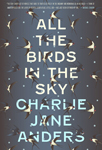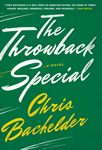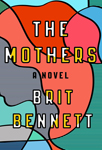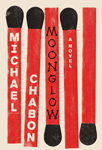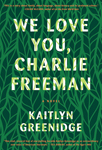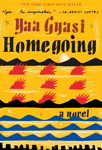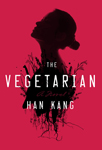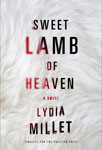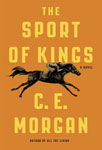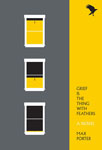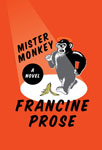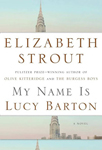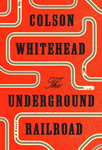by Charlie Jane Anders
Buy it at Powell’s »Caille Millner: Sweet Lamb of Heaven by Lydia Millet is part literary novel and part psychological thriller. It’s a quiet, ominous book, confined to the mind of its heroine and full of questions about resolutely unhip matters like the meaning of existence. These qualities made it an unusual contender during the 2016 book awards season, when it was longlisted for the National Book Award.
It’s also an unusual contender against Homegoing, for this tournament. Homegoing covers centuries and countries with an epic sweep, and it takes on a big current issue: the lasting effects of the enslavement of millions of people from the African diaspora.
When it comes to novels, I love both of these forms—the small, strange book and the big, sweeping one. But it seems to be true that the latter is more likely to be appreciated by awards judges. (A brief glance through the lists of recent Pulitzer and National Book Award winners shows the prevalence of idea-driven novels set against a big historical backdrop, from William T. Vollmann’s opus Europe Central to Viet Thanh Nguyen’s The Sympathizer.)
I kept this dilemma in mind while I was reading. The plot of Sweet Lamb of Heaven is as follows: Anna is stuck in a loveless marriage to a callow, ruthlessly ambitious man named Ned, in Alaska. When she gives birth to their daughter, Lena, Anna starts hearing a mysterious voice’s constant babble in her head, singing ditties, offering wisdom, impressing her with different languages. One of Millet’s best choices is to have Anna handle the strange voice in a brisk, realistic manner. Anna even talks about it with humor: “Joan of Arc had heard a voice advising her to help raise the siege of Orleans, but as far as I could tell the voice had no specific instructions for the likes of me.”
When the book opens, though, Anna’s got other problems. Since leaving Ned without telling him why several years ago, she’s been living off the grid with Lena in a ramshackle motel on the Maine coast. After many years, Ned tracks her down and tells her she needs to return to Alaska—or else. Then things start getting really weird.
Meanwhile, Yaa Gyasi’s debut novel Homegoing begins in coastal Ghana in the mid-1700s. Over the course of 300 pages, she unwinds two and a half centuries’ worth of stories about the descendants of a Fante warrior and his Asante house slave. One half of the family is sold into American slavery and the other half remain in Ghana to deal with the fallout of their participation in the international slave trade and all that follows: more war, more poverty, and then the scourge of British colonialism.
Gyasi moves the action forward by offering short, concise chapters starring a major family member from each generation. The pace is quick—we leap from the Cape Coast Castle, a massive slave fort in Ghana, to a Mississippi slave plantation, to Baltimore during the Fugitive Slave Act, to the Great Migration and Independence-era pan-Africanism. As a reader, sometimes it felt like barreling through space and history. The family tree in the front of the book is more than just a nod to Gabriel García Márquez’s One Hundred Years of Solitude, an obvious predecessor: It’s a necessary tool.
Gyasi uses recurring metaphors to thread together so many disparate stories (fires and long, hopeless journeys happen over and over). She also tracks a shared heirloom, a black stone necklace, as it makes its fragile way down the centuries. The necklace seems to give the women of the novel special powers of persistence as they set off on their journeys into the dark decades before them: “The next morning Abena set out for Kumasi, and when she arrived at the missionary church there, she touched the stone at her neck and said thank you to her ancestors.”
These very different books have very different strengths and limitations. Sweet Lamb of Heaven has refined prose, mordant humor, and a tense string of supernatural events that take hold of the reader’s mind just as they do Anna’s. But there were basic elements of the book that I found too frustrating to allow myself to be swept away.
Anna is the well-educated daughter of a well-off family—a sensible and intelligent woman with resources. So when faced with difficulties, it seemed unrealistic that she wouldn’t make any sensible, intelligent, well-resourced choices. I never quite believed that Anna would leave her husband and move their daughter out of state without speaking to anyone, including a divorce lawyer. Nor did I believe that such a devoted mother wouldn’t act quickly when faced with obvious danger to herself and her child. For me, Sweet Lamb of Heaven’s credibility gaps came in the form of life’s ordinary material, not any of its supernatural elements.
A smaller novel that takes place in a small area and relies completely on a singular narrative consciousness has to nail all of the little details. In my case, since I couldn’t fully buy into Anna’s understanding of events, I couldn’t fully surrender to Sweet Lamb of Heaven.
Homegoing isn’t flawless, either: Its rapid-fire format can make it feel like we’re racing through history. There’s little time to savor each character, which is a shame—many of them are so alive on the page that they deserve books of their own. And curiously, the book’s weakest chapters are the ones set in recent history. But the expansive range of Homegoing means that not every detail has to be perfect. Maybe that’s why it’s easier for the epic-style novel to win over the small-scale one.
Gyasi’s rendering of so many different worlds, stories, and historical events makes for a rich, marvelous, and all-consuming reading experience. Homegoing is my choice for the next round.
Match Commentary
By Kevin Guilfoile & John Warner
Kevin Guilfoile: Before we get into today’s commentary, we want to say two things quickly on behalf of Andrew and Rosecrans. First, a huge, huge thank you to everyone who’s become a TMN Supporter. It’s been such a heartwarming embrace to see so many people contribute to keep TMN and the ToB going. Thank you, each and every one.
John Warner: Second, if you haven’t become a Sustaining Member yet, please do so now. Your contribution will make a big difference in enabling them to keep this thing rolling year after year.
Kevin: OK, back to the show…
John: Let’s get to it. OK, when I read it, Sweet Lamb of Heaven freaked my shit out. I mean it spooked me, and I don’t consider myself easily spooked. As Judge Millner notes, it’s a bit difficult to categorize, and falls into this year’s trend of genre hybrids, perhaps not so titled toward genre as Version Control (which has advanced to the quarterfinals), but containing plenty of psychological suspense DNA.
Lydia Millet writes strange—and, I think, wonderful—books. Her work can be tough to categorize because she seems to try out different modes one book to the next, but at heart, I think she’s a satirist, just not the always “funny ha-ha” kind of satirist. It feels a little unfair to judge Anna by what Millner “believes” she would do. Millet’s novels, while set in our recognizable reality, are really more self-contained worlds that make use of reality in their creation as a way of setting the real world in relief, as satires do.
Maybe that’s just a rationalization for what others see as a flaw but I’m willing to excuse, because this author had built up so much goodwill with me—not only with this book, but with previous books as well. Going into the tournament, I was going to back Sweet Lamb of Heaven against just about any other competitor.
And then I read Homegoing and that conviction started to wobble.
Kevin: Instead of just reading these novels straight-up, I think Judge Millner was attempting to account for their differences even before she started (as opposed to just lamenting them). She brought a level of knowingness to the assignment that I’m not sure a lot of other judges attempt, or at least they haven’t spoken about it so plainly in their judgments. I think that’s an interesting and perfectly legitimate approach, and in this case it might even have been in Sweet Lamb of Heaven’s favor, given the gravitational advantages a big book like Homegoing possesses.
Let’s face it, Homegoing is a stunner of a novel. This is a confession of my own narrow experience, but I don’t think I’ve ever read a piece of fiction set in West Africa during the slave trade that wasn’t told from the perspective of the colonizers. It was thrilling and devastating. More than that, Gyasi doesn’t just rest on the power of the subject matter. This is also a pretty closely observed piece of writing. No, you don’t get hundreds of pages with each character and time period, but what you do get feels detailed and real. This is true even on the most fundamental level. I remember thinking to myself as I was reading, “I have no idea what an 18th-century African village looks like,” and yet I had no difficulty visualizing it. As an author and guide, Gyasi is a wonderful companion.
John: Similar to the now-departed High Dive, Homegoing revealed experiences and history of which I was aware, but didn’t know. The structure of these linked stories, marching forward through time, is ingenious in giving the book scope while also fraught with peril, as we have very little time and space to get invested in the stories of the characters featured in a particular chapter.
But chapter after chapter, Gyasi pulls it off. It is true that we don’t have time to “savor” these characters, but this spirit seems to fit the story that Gyasi is telling. We don’t get access to the full lives of these figures. Their stories have historically not been valued and told.
I do think that the individual stories lose some power as time advances, the final sections maybe a bit rushed toward closure, perhaps a touch too tidy, but this book looks like a strong Rooster contender to me.
Kevin: What really blew me away was the lack of sentimentality. That had to have been so hard to resist. The main character in one chapter gets killed off in half a sentence in the next, and Gyasi doesn’t dwell on the heroes and villains aspects of her story. If you forced me to put down a nickel right now on a novel to win this year’s Rooster, I would put it on Homegoing.
John: I still think The Underground Railroad is the favorite, but not nearly as overwhelming as I would have said entering the tourney. You and I get the rest of the opening round off as our bookseller commentators take over for the final two matches, starting with Sue Kowalski and Jenny Fischer from The Bookstore, the pride of Glen Ellyn, Ill., and one of the very earliest retail outlets to champion the Tournament of Books. They’ll be commenting on a battle of debuts: The Nix and We Love You, Charlie Freeman, judged by writer Lili Loofbourow.
Kevin: I know The Bookstore well, and Glen Ellyn is close enough to my own little town for me to consider Sue and Jenny the home team. I’m much looking forward to what they have to say tomorrow.



